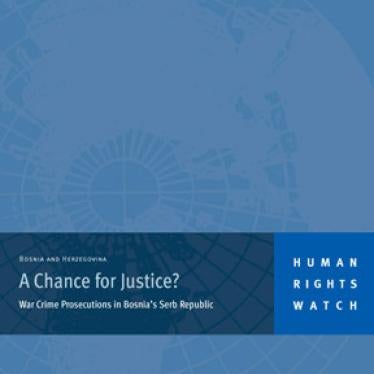After 10 years of allowing suspected war criminals to go free, Bosnia’s Serb Republic is taking its first steps to bring them to justice, Human Rights Watch said in a report released today. But sustaining that progress depends on local commitment and international support.
“For the first time since the end of the Bosnian war, victims may see some justice in Republika Srpska,” said Holly Cartner, Europe and Central Asia director at Human Rights Watch. “But the challenges are huge. Without the political will to reform the justice system, terrible crimes will continue to go unpunished.”
The 42-page report, “A Chance for Justice? War Crime Prosecutions in Bosnia’s Serb Republic,” describes the increased momentum towards war crimes trials at the end of 2005, and the opportunity created by the transfer of cases from the new War Crimes Chamber in Sarajevo. It also documents the obstacles to sustained progress on fair and effective prosecutions, including limited prosecutorial resources and insufficient assistance by Republika Srpska police.
The majority of the crimes committed during the 1992-1995 Bosnian war occurred in territory controlled by Bosnian Serb forces, known as Republika Srpska. But in the 10 years since the end of the war in Bosnia-Herzegovina, now made up of Republika Srpska and the Muslim- and Croat-dominated Federation, there have been almost no prosecutions in the Serb entity, with only two trials completed by November 2005. By contrast, there were a dozen trials in Serbia and Montenegro, more than 50 prosecutions in the Bosnian Federation, and an even larger number of trials in Croatia during the same period, including against defendants from the ethnic majority in each location.
At the end of 2005, war crimes prosecutions in Republika Srpska gained momentum, with a total of five Serbs convicted on war crimes charges, following three trials held in district courts in Banja Luka and Trebinje. In March 2006, as the Human Rights Watch report was going to press, the district court in Banja Luka convicted a Serb on war crimes charges, and a fifth war crimes trial was ongoing in the Trebinje district court.
The increase in the number of prosecutions reflects a greater willingness on the part of Republika Srpska authorities to bring war crimes suspects to trial, as the result of the loosening grip of extreme nationalists on politics in the entity. More importantly, the creation of the new Sarajevo War Crimes Chamber, intended to adjudicate particularly serious war crimes which occurred in both entities, has significantly increased the number of war crime cases likely to be heard in Republika Srpska. During 2005, the chief prosecutor in Bosnia transferred around 40 such cases to Republika Srpska prosecutors, and further transfers are possible.
The number of prosecutors working on war crimes cases in Republika Srpska’s five district courts appears inadequate to handle the increasing caseload. Prosecutorial offices also lack support staff and specialist investigators. Republika Srpska police are focused on investigating war crimes against Bosnian Serbs, despite the fact that most prosecutions in the Republika Srpska courts are likely to involve crimes against Bosnian Muslims and Croats.
The report also analyses other weaknesses of the war crimes investigations in Republika Srpska, including: the failure of the prosecutors to make use of information gathered by nongovernmental organizations, transcripts from the International Criminal Tribunal for the former Yugoslavia, and other material; witness intimidation and fatigue; and the non-availability of suspects, many of whom are believed to have fled to Serbia and Croatia and acquired citizenship there, immunizing them against extradition to face trial in Republika Srpska.
Fair and effective war crimes prosecutions in Republika Srpska are vital to overall efforts in Bosnia to hold the guilty accountable, as underscored by the number of expected trials, the seriousness of the crimes, and the importance to victims and their families of seeing justice done. While those who face trial in local courts are likely to be direct perpetrators rather than commanders, the recently completed trials involved charges of multiple killing, disappearance, and rape.
“The local courts in Republika Srpska are dealing with very serious crimes,” said Cartner. “The authorities there must do all they can to ensure that justice is finally done.”
The European Commission representatives are scheduled to visit Sarajevo on March 17, to continue negotiations with the Bosnian government on a Stabilization and Association Agreement. The E.U. has already given its support to the work of the War Crimes Chamber in Sarajevo, acknowledging its role as a crucial instrument for justice in Bosnia. However, many, if not most, war crimes prosecutions in Bosnia will take place in the courts in Bosnia’s two entities. The E.U. should recognize the equally vital role of Bosnia’s lower courts in delivering justice, and give them its support, Human Rights Watch said.
The Human Rights Watch report includes recommendations to the authorities in Republika Srpska and national authorities in Sarajevo to take positive action to enhance the capacity and effectiveness of the district prosecutors’ office so that the recent progress can be sustained. Such action includes: recruiting professional investigators, better training for prosecutors, enhanced police cooperation, and a witness protection program. The report also urges the European Union and United States government to ensure that accountability for war crimes, including in local courts, is consistently prioritized in relations with the Bosnian national government and the Republika Srpska authorities.







